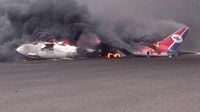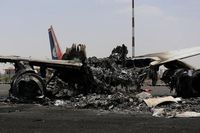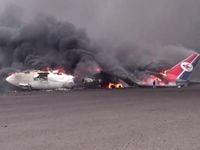In a dramatic escalation of hostilities, Israeli airstrikes on May 6, 2025, have left Sanaa International Airport in Yemen’s Houthi-controlled capital heavily damaged, with losses estimated at around $500 million. The strikes, which targeted the airport and other civilian infrastructure, were described by Yemeni officials as a barbaric assault that has forced the suspension of all flights indefinitely.
Khaled al-Shaif, the airport's director, reported that the Israeli attacks destroyed terminal buildings, equipment, and a warehouse, leading to the loss of three Yemenia Airways aircraft. "The enemy caused significant losses," al-Shaif stated during an interview with Houthi-aligned media outlet Al-Masirah. He added that all flights to and from the airport have been suspended until further notice, and that full restoration of operations would take a considerable amount of time.
The Israeli strikes came in retaliation for a Houthi missile attack that struck near Tel Aviv’s Ben Gurion Airport on May 4, 2025. This missile attack, which resulted in minor injuries and temporarily closed the airport, marked a significant escalation from the Houthis, who have increasingly targeted Israel and shipping routes in the Red Sea amid the ongoing Gaza conflict.
On the day following the missile incident, the Israel Defense Forces (IDF) confirmed that their fighter jets had struck Sanaa International Airport, labeling it a "central hub for the Houthi terrorist regime". They claimed the facility was being used to transfer weapons and operatives, emphasizing the exploitation of civilian infrastructure for military purposes.
The IDF stated that the airstrikes were conducted with precision, aiming to minimize harm to civilians. However, the extensive damage reported at the airport raises serious concerns about the impact of such military actions on civilian life and infrastructure.
In addition to the airport, Israeli warplanes also targeted a power station in Sanaa and a cement factory in nearby Amran, further intensifying the conflict and its toll on civilian infrastructure. Thick smoke was seen rising from the airport as planes burned following the strikes, highlighting the immediate consequences of the military escalation.
In the wake of these developments, Yemeni authorities issued an extraordinary NOTAM (Notice to Airmen) stating that Sanaa airport had been closed due to the extensive damage caused by the Israeli bombardment. Yemenia Airways condemned the attack, asserting that it inflicted extensive damage to property and resulted in the grounding of its aircraft.
"We condemn in the strongest terms the attack," Yemenia stated, asserting its legal right to seek compensation for the damages in accordance with international civil aviation laws. The airline has indicated that it will spare no effort to return to operation, despite the challenges posed by the current situation.
The Houthis have vowed to continue their rocket attacks on Israel, with prominent spokesperson Hazem al-Asad warning of further escalation. "Does the Zionist entity have enough shelters?" he questioned on social media, hinting at the potential for increased military activity in the region. His comments came shortly after U.S. President Donald Trump announced an end to American military operations against the Houthis, leaving Israel as the primary actor confronting the group.
Despite the ceasefire agreement reached between the Houthis and the United States on May 6, which aimed to ensure freedom of navigation in the Red Sea, the deal did not address Israel's military actions. The Houthis have been attacking Israel and merchant shipping in the Red Sea and Gulf of Aden since late 2023, claiming to act in solidarity with Palestinians amid the ongoing Gaza conflict.
As the conflict intensifies, airlines have begun to suspend flights to Ben Gurion Airport, citing safety concerns. Major carriers such as Delta Air Lines, United Airlines, Ryanair, Air France-KLM, British Airways, and Lufthansa Group have announced temporary cancellations, reflecting the growing unease surrounding travel to and from Israel.
In a statement, SWISS Airlines confirmed it would suspend flights to and from Tel Aviv until May 6, 2025, offering affected passengers the option for rebooking or full refunds. The airline's decision underscores the broader implications of the conflict on regional travel and commerce.
The situation remains fluid, with Yemeni authorities implementing emergency plans to repair the damage and restore operations at Sanaa airport as soon as possible. The civil aviation authority has expressed its commitment to returning the airport to operational status, highlighting its importance for humanitarian purposes.
As the conflict continues to unfold, the international community watches closely, concerned about the potential for further escalation and its ramifications for regional stability. The destruction of civilian infrastructure in Sanaa raises critical questions about the humanitarian impact of military actions and the need for a diplomatic resolution to the ongoing hostilities.



